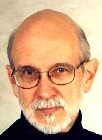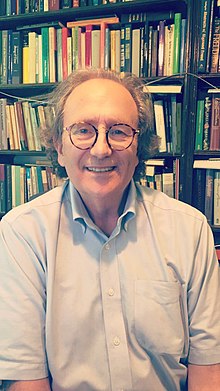
Pantheism is the belief that reality, the universe and the cosmos is identical with divinity and a supreme supernatural being or entity, pointing to the universe as being an immanent creator deity still expanding and creating, which has existed since the beginning of time, or that all things compose an all-encompassing, immanent god or goddess and regards the universe as a manifestation of a deity. This includes all astronomical objects being viewed as part of a sole deity.
Naturalistic pantheism, also known as scientific pantheism, is a form of pantheism. It has been used in various ways such as to relate God or divinity with concrete things, determinism, or the substance of the universe. God, from these perspectives, is seen as the aggregate of all unified natural phenomena. The phrase has often been associated with the philosophy of Baruch Spinoza, although academics differ on how it is used.

Nicholas Rescher is a German-American philosopher, polymath, and author, who has been a professor of philosophy at the University of Pittsburgh since 1961. He is chairman of the Center for Philosophy of Science and was formerly chairman of the philosophy department.

Charles Hartshorne was an American philosopher who concentrated primarily on the philosophy of religion and metaphysics, but also contributed to ornithology. He developed the neoclassical idea of God and produced a modal proof of the existence of God that was a development of Anselm of Canterbury's ontological argument. Hartshorne is also noted for developing Alfred North Whitehead's process philosophy into process theology.

Religious naturalism combines a naturalist worldview with ideals, perceptions, traditions, and values that have been traditionally associated with many religions or religious institutions. "Religious naturalism is a perspective that finds religious meaning in the natural world and rejects the notion of a supernatural realm." The term religious in this context is construed in general terms, separate from the traditions, customs, or beliefs of any one of the established religions.
The following outline is provided as an overview of and topical guide to philosophy:
Metaphysical naturalism is a philosophical worldview which holds that there is nothing but natural elements, principles, and relations of the kind studied by the natural sciences. Methodological naturalism is a philosophical basis for science, for which metaphysical naturalism provides only one possible ontological foundation. Broadly, the corresponding theological perspective is religious naturalism or spiritual naturalism. More specifically, metaphysical naturalism rejects the supernatural concepts and explanations that are part of many religions.
Robert Cummings Neville is an American systematic philosopher and theologian, author of numerous books and papers, and ex-Dean of the Boston University School of Theology. J. Harley Chapman and Nancy Frankenberry, editors of a festchrift—a collection of critical essays written in Neville's honor—entitled Interpreting Neville, consider him to be "one of the most significant philosophers and theologians of our time". Neville was Dean of Humanities and Fine Arts at the State University of New York at Stony Brook, and has taught at Yale, Fordham, and the State University of New York Purchase. He is now a professor at Boston University He was granted a Doctorate honoris causa by the Russian Academy of Sciences Institute of Far Eastern Studies in 1996.
Metaphysics is the branch of philosophy that investigates principles of reality transcending those of any particular science. Cosmology and ontology are traditional branches of metaphysics. It is concerned with explaining the fundamental nature of being and the world. Someone who studies metaphysics can be called either a "metaphysician" or a "metaphysicist".
The following outline is provided as an overview of and topical guide to metaphysics:

Jerome A. Stone is an American author, philosopher, and theologian. He is best known for helping to develop the religious movement of Religious Naturalism. Stone is on the Adjunct Faculty of Meadville Lombard Theological School; is Emeritus Professor of Philosophy at William Rainey Harper College; is in Preliminary Fellowship with the Unitarian Universalist Association; and is a member of the Highlands Institute of American Religious and Philosophical Thought and the Institute on Religion in an Age of Science (IRAS).

Spiritual naturalism, or naturalistic spirituality combines a naturalist approach to spiritual ways of looking at the world. Spiritual naturalism may have first been proposed by Joris-Karl Huysmans in 1895 in his book En Route.
Coming into prominence as a writer during the 1870s, Huysmans quickly established himself among a rising group of writers, the so-called Naturalist school, of whom Émile Zola was the acknowledged head...With Là-bas (1891), a novel which reflected the aesthetics of the spiritualist revival and the contemporary interest in the occult, Huysmans formulated for the first time an aesthetic theory which sought to synthesize the mundane and the transcendent: "spiritual Naturalism".

Donald Allen Crosby is an American theologian who is Professor Emeritus of Philosophy at Colorado State University, since January 2000. Crosby's interests focus on metaphysics, American pragmatism, philosophy of nature, existentialism, and philosophy of religion. He is a member of the Highlands Institute of American Religious and Philosophical Thought (HAIRPT) and has been a leader in the discussions on Religious Naturalism.

American philosophy is the activity, corpus, and tradition of philosophers affiliated with the United States. The Internet Encyclopedia of Philosophy notes that while it lacks a "core of defining features, American Philosophy can nevertheless be seen as both reflecting and shaping collective American identity over the history of the nation."
Robert F. Almeder is Professor Emeritus of Philosophy at Georgia State University. He is known in particular for his work on the philosophy of science, and has also written on the philosophy of mind, epistemology and ethics. He is the author of 24 books, including The Philosophy of Charles S. Peirce (1980), Death and Personal Survival (1992), Harmless Naturalism: The Limits of Science and the Nature of Philosophy (1998), Human Happiness and Morality (2000), and Truth and Skepticism (2010).
This is a list of articles in philosophy of religion.
Michael Cannon Rea is an American analytic philosopher and, since 2017, John A. O'Brien Professor of Philosophy at the University of Notre Dame. He delivered the 2017 Gifford Lecture on divine hiddenness.

Justus Buchler was an American philosopher, author and professor. He made contributions to the subjects of naturalism and metaphysics, introducing the concept of the natural complex.
In philosophy, naturalism is the idea or belief that only natural laws and forces operate in the universe.
Naturalism is not so much a special system as a point of view or tendency common to a number of philosophical and religious systems; not so much a well-defined set of positive and negative doctrines as an attitude or spirit pervading and influencing many doctrines. As the name implies, this tendency consists essentially in looking upon nature as the one original and fundamental source of all that exists, and in attempting to explain everything in terms of nature. Either the limits of nature are also the limits of existing reality, or at least the first cause, if its existence is found necessary, has nothing to do with the working of natural agencies. All events, therefore, find their adequate explanation within nature itself. But, as the terms nature and natural are themselves used in more than one sense, the term naturalism is also far from having one fixed meaning.

Victorino Tejera was a writer, scholar, and professor of philosophy with specializations in ancient Greek thought, Metaphysics, Aesthetics, and American philosophy. He was born in Caracas, Venezuela. He is known especially for his writing on Plato's Dialogues. Many scholars believe Tejera's work in this area is his most valuable contribution to philosophy. He was editor and contributor with Thelma Lavine on History and Anti-History in Philosophy whose FromSocrates to Sartre (1984) was the basis for the PBS series of the same name.










